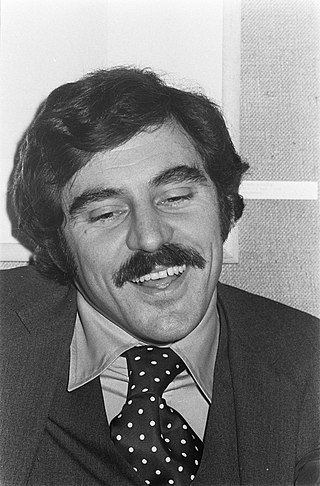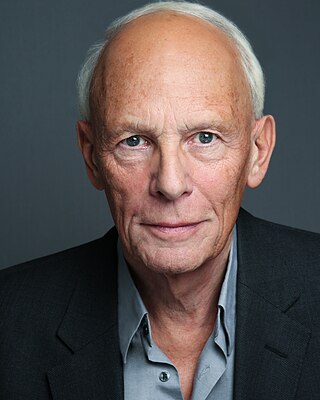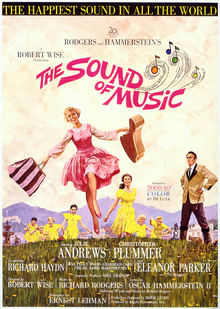See also
- The Sound of Musicals , a 2006 BBC series of musical performances
- The Sound of Silence (disambiguation)
The Sound of Music is a 1959 musical by Rodgers and Hammerstein.
The Sound of Music may also refer to:

The Sound of Music is a musical with music by Richard Rodgers, lyrics by Oscar Hammerstein II, and a book by Howard Lindsay and Russel Crouse. It is based on the 1949 memoir of Maria von Trapp, The Story of the Trapp Family Singers. Set in Austria on the eve of the Anschluss in 1938, the musical tells the story of Maria, who takes a job as governess to a large family while she decides whether to become a nun. She falls in love with the children, and eventually their widowed father, Captain von Trapp. He is ordered to accept a commission in the German Navy, but he opposes the Nazis. He and Maria decide on a plan to flee Austria with the children. Many songs from the musical have become standards, including "Do-Re-Mi", "My Favorite Things", "Edelweiss", "Climb Ev'ry Mountain", and the title song "The Sound of Music".

Petula Clark CBE is a British singer, actress, and songwriter. She started her professional career as a child performer and has had the longest career of any British entertainer, spanning more than 85 years.

John Barry Prendergast was an English composer and conductor of film music. Born in York, Barry spent his early years working in cinemas owned by his father. During his national service with the British Army in Cyprus, Barry began performing as a musician after learning to play the trumpet. Upon completing his national service, he formed a band in 1957, the John Barry Seven. He later developed an interest in composing and arranging music, making his début for television in 1958. He came to the notice of the makers of the first James Bond film Dr. No, who were dissatisfied with a theme for James Bond given to them by Monty Norman. Noel Rogers, the head of music at United Artists, approached Barry. This started a successful association between Barry and the Bond series that lasted for 25 years.

Porgy and Bess is an English-language opera by American composer George Gershwin, with a libretto written by author DuBose Heyward and lyricist Ira Gershwin. It was adapted from Dorothy Heyward and DuBose Heyward's play Porgy, itself an adaptation of DuBose Heyward's 1925 novel Porgy.

Anthony Newley was an English actor, singer, songwriter, and filmmaker. A "latter-day British Al Jolson", he achieved widespread success in song, and on stage and screen. "One of Broadway's greatest leading men", from 1959 to 1962 he scored a dozen entries on the UK Top 40 chart, including two number one hits. Newley won the 1963 Grammy Award for Song of the Year for "What Kind of Fool Am I?", sung by Sammy Davis Jr., and wrote "Feeling Good", which became a signature hit for Nina Simone. His songs have been sung by a wide variety of singers including Fiona Apple, Tony Bennett, Barbra Streisand, Michael Bublé and Mariah Carey.

Alvin and the Chipmunks, originally David Seville and the Chipmunks and billed for their first two decades as the Chipmunks, are an American animated virtual band and media franchise first created by Ross Bagdasarian for Novelty records in 1958. The group consists of three singing animated anthropomorphic chipmunks named Alvin, Simon, and Theodore.
Hairspray may refer to:
A cast recording is a recording of a stage musical that is intended to document the songs as they were performed in the show and experienced by the audience. An original cast recording or OCR, as the name implies, features the voices of the show's original cast. A cast recording featuring the first cast to perform a musical in a particular venue is known, for example, as an "original Broadway cast recording" (OBCR) or an "original London cast recording" (OLCR).
Wonderland may refer to:
Catch Me If You Can is a 2002 film directed by Steven Spielberg.
John Valmore Pearson was a British composer, orchestra leader and pianist. He led the Top of the Pops orchestra for sixteen years, wrote a catalogue of library music, and had many of his pieces used as the theme music to television series.
Cinderella is a classic fairy tale.
A soundtrack album is any album that incorporates music directly recorded from the soundtrack of a particular feature film or television show. The first such album to be commercially released was Walt Disney's Snow White and the Seven Dwarfs, the soundtrack to the film Snow White and the Seven Dwarfs, in 1938. The first soundtrack album of a film's orchestral score was that for Alexander Korda's 1942 film Rudyard Kipling's Jungle Book, composed by Miklós Rózsa.

Vincent Hill was an English traditional pop singer, best known for his cover version of the Rodgers and Hammerstein show tune "Edelweiss" (1967), which reached No. 2 on the UK Singles Chart. He recorded 25 studio albums and several soundtracks, wrote songs and plays and hosted TV shows during the 1970s and 1980s, including They Sold a Million (BBC), Musical Time Machine (BBC) and the chat show Gas Street (ITV). Outside of his work in show business, he was a patron of the Macular Society, a UK charity for anyone affected by central vision loss.

Paul Nicholas is an English actor and singer, best known for his work in the 1983 BBC sitcom Just Good Friends. The show won a BAFTA and Nicholas was nominated for best comedy performance.

The Sound of Music is a 1965 American musical drama film produced and directed by Robert Wise from a screenplay written by Ernest Lehman, and starring Julie Andrews and Christopher Plummer, with Richard Haydn, Peggy Wood, Charmian Carr, and Eleanor Parker. The film is an adaptation of the 1959 stage musical composed by Richard Rodgers, with lyrics by Oscar Hammerstein II and a book by Lindsay and Crouse. It is based on the 1949 memoir The Story of the Trapp Family Singers by Maria von Trapp and is set in Salzburg, Austria. It is a fictional retelling of her experiences as governess to seven children, her eventual marriage with their father Captain Georg von Trapp, and their escape during the Anschluss in 1938.
"The Sound of Music" is the title song from the musical of the same name that premiered in 1959. It was composed by Richard Rodgers with lyrics written by Oscar Hammerstein II. The song introduces the character of Maria, a young novice in an Austrian abbey.

South Pacific is a 1958 American romantic musical film based on the 1949 Rodgers and Hammerstein musical South Pacific, which in turn is loosely based on James A. Michener's 1947 short-story collection Tales of the South Pacific. The film, directed by Joshua Logan, stars Rossano Brazzi, Mitzi Gaynor, John Kerr and Ray Walston in the leading roles with Juanita Hall as Bloody Mary, the part that she had played in the original stage production. The film was nominated for three Academy Awards, winning the Academy Award for Best Sound for Fred Hynes. It is set in 1943, during World War II, on an island in the South Pacific.
Funny Girl may refer to:

The Sound of Music: Music from the NBC Television Event, also known as The Sound of Music: 2013 NBC Television Cast, or sometimes simply The Sound of Music, is a soundtrack album for The Sound of Music Live! released by Sony Masterworks on December 3, 2013. Released in CD and digital download formats, the album includes studio recordings instead of live tracks; the live performance was broadcast two days after the album release. A bonus compilation of nine instrumental tracks from the score was available exclusively through Walmart outlets. The album peaked at number 17 on the Billboard 200 and number 2 on the Billboard Soundtracks.